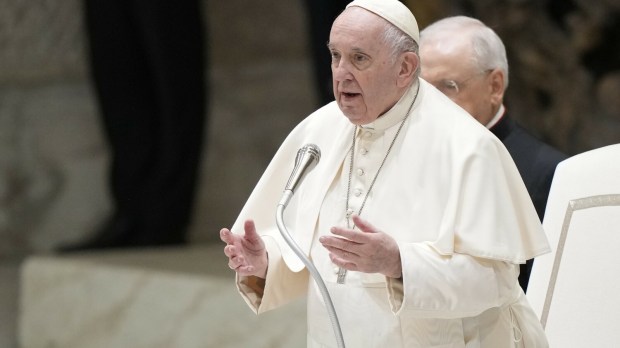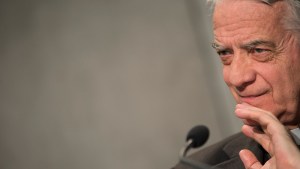In view of the 10th anniversary of Pope Francis’ pontificate on March 13, 2023, Pope Francis gave a long joint interview to the Belgian weeklies Tertio (Dutch-speaking) and Dimanche (French-speaking) on December 19, 2022. The interview was published by the portal Cathobel in two parts, one on February 28 and the other on March 1.
In this interview with journalist Emmanuel Van Lierde, the Pope discusses several current issues, including the war in Ukraine, the synodal process, and his vision of the Church’s social responsibility.
For Francis the war is “very painful”
When asked about the war in Ukraine, the Pope said that “the Vatican has taken this conflict to heart from day one.” Francis has sent cardinals on the ground to express his compassion for the Ukrainian people. “I am also in contact with Ukrainians. President Volodymyr Zelensky has sent several delegations to speak with me,” the Pontiff explained. He did not mention Vladimir Putin, but spoke of the need to “keep talking with the Russian people in order to do something.”
Disturbed by the acts of torture committed by Russian forces in Ukraine, especially against children, the Pope also placed this conflict in the context of an ongoing world war. He cited again the examples of Myanmar, Syria, and Yemen and denounced the power of the arms industry. “When a rich country begins to weaken, it is said that it needs a war to hold on and become stronger again. This is what weapons prepare for,” the Pope insisted, worried about the risk of the conflict spreading.
“It is said that the Spanish Civil War was used to test weapons for the Second World War. I don’t know if it’s true, but weapons are always tested, aren’t they? It is the industry of destruction, the industry of war, of a world at war,” the 86-year-old Pontiff lamented, while remembering his moving visits to military cemeteries. “For me it’s very painful, very painful, and I can’t choose a side, war is bad in itself.”
Synod tempted “by the evil spirit”
Pope Francis places the current synodal process in the footsteps of the Second Vatican Council, which he considers “a visit from God to his Church.”
“At the end of the Council, Paul VI was very shocked to see that the Western Church had almost lost its synodal dimension, while the Eastern Catholic Churches had managed to preserve it,” explained Francis. He recalled that his predecessor had therefore created the Secretariat for the Synod of Bishops, which has evolved over the past 60 years.
Touching on a controversial point, the Pope suggested that in future assemblies, voting could no longer be reserved for bishops alone. “Sometimes it was not clear whether women could vote … At the last Amazon synod in October 2019, minds matured in that direction,” he explained.
“The two synods on synodality will help us to clarify the meaning and method of decision-making in the Church,” Francis said. He underlined that “to consider a synod as a parliament is a mistake.” It is above all an “assembly of believers,” who are given time to speak and also to be silent and pray, he insists.
However, he recognized that this “assembly of faith led by the Holy Spirit” is “also tempted and seduced by the evil spirit.”
Reconciling spiritual and social commitment
“A church that does not celebrate the Eucharist is not a church. But a church that hides in the sacristy is not a church either,” explained Francis. He emphasized that “the breaking of the bread” implies “a social obligation, the obligation to care for others.”
“The social commitment of the Church is a reaction, a consequence of worship. This commitment should not be confused with philanthropic action, which a non-believer can also undertake,” the Pope said.
Speaking to Catholic media in a country that has liberalized euthanasia, the 86-year-old Pontiff also reminded of the responsibility to care for different generations. “The elder should not be kept in a warehouse or in a museum, but should be able to continue to give to society what he has in him. There is a mission for the elder,” who must be considered with care, “even if he is no longer in good health or fully conscious.”
The Pope also insisted on the “prophetic” fruitfulness of dialogue between the young and the old.
“I remember an activity where we offered to some young people to play guitar in a nursing home. ‘Pfff, pfff, this is going to be boring’….’Let’s go anyway.’ And then they didn’t want to leave anymore, they started to sing and the dialogue with the elderly started,” the Pope recounted with amusement.
However, he says “it is very sad that some retirement homes adopt an overly commercial line, with the result that tenderness is lost.”
More broadly, he assured that he supports the evolution of the “social market economy,” a theme developed by his predecessor John Paul II. Francis cites the example of a Belgian entrepreneur who developed a textile company in Argentina by making his employees shareholders.
A new saint for journalists?
The Pope also expressed his support for the idea of making the Dutch saint Titus Brandsma (1881-1942) the co-patron of journalists, along with St. Francis de Sales. “I will contact the Dicastery for the Causes of Saints to see what is possible. It would be a pleasure for me in any case,” Pope Francis said.
He encouraged journalists to continue their “noble profession” of “transmitting the truth” without losing their critical sense.
How the Pope sees his own death
The 45-minute interview in Spanish was held the day after Argentina won the World Cup final against France. In an article recounting the context of the interview, the journalist explained that upon understanding that the interview would be published several months later, the Pope “frowned” and said, “What if something happens to me in the meantime?” However, he said that a posthumous publication would allow him to say a final word “from the grave, desde la tumba.”
The journalist also testified to the Pope’s palpable suffering in the face of the “incessant horrors of war in so many places in the world.”
“He considers it a personal defeat that he cannot prevent further bloodshed and that his calls for dialogue remain unanswered,” wrote Emmanuel Van Lierde.
The Pope had already been interviewed by the weekly Tertio in November 2016, again through the Bishop Emeritus of Ghent, Luc Van Looy, who also participated in this interview. The 81-year-old Belgian bishop has remained close to the Argentine pontiff despite his renunciation of the cardinalate in the August 2022 consistory, due to accusations of mishandling abuse in his diocese.


